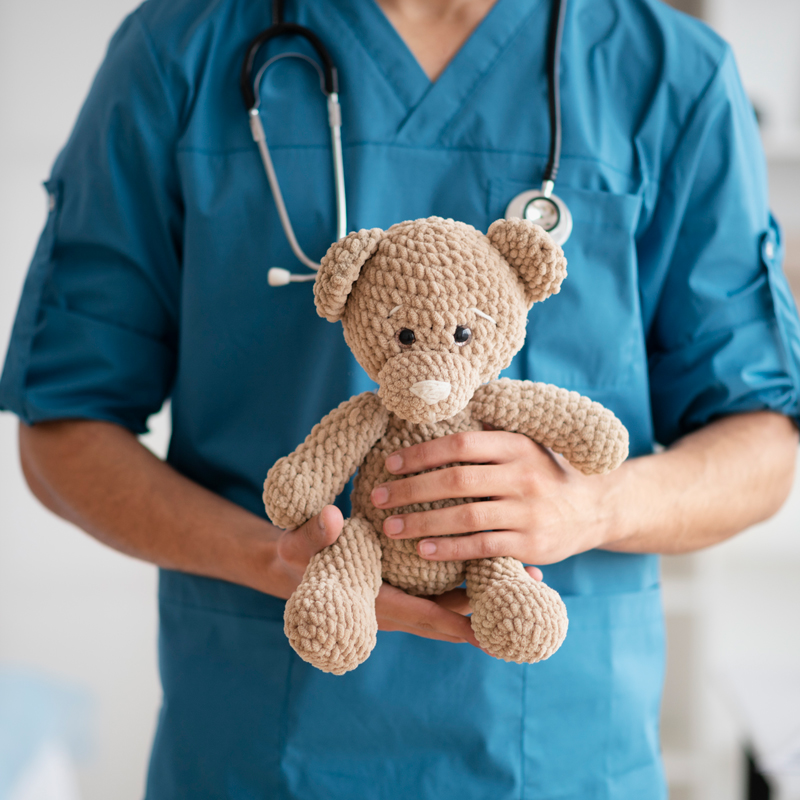
Pediatrics
• Pediatric surgeons
• Otorhinolaryngologists
• Pediatric orthopedics
• Cardiologists
• Neurologists
• Pediatric ophthalmologists
• Pediatric gastroenterologists
• Diabetologists
• Microbiological labs
• Ultrasound scanners
• Axial and Magnetic tomography
• EEG
• EKG
• Heart ultrasound
Permanent and external collaborators of the Pediatric department
Regarding the other subspecialties of Pediatrics, we have external partners, such as Pediatric Gastroenterologist, Pediatric Neurologist, Pediatric Allergist, Pediatric Pulmonologist, Pediatric Endocrinologist, Pediatric Nephrologist, and we also collaborate with the University Pediatric Clinics of Aristotle University of Thessaloniki (AUTH).
The department treats diseases of the entire spectrum of General Pediatrics and its subspecialties (Pediatric Pulmonology, Pediatric Gastroenterology, etc.), as well as Pediatric Surgery and its subspecialties (Urology, Gastroenterology, ENT, etc.). The immediate treatment of the problem takes place either by administering medication or by recommending admission to the hospital for further treatment.
• Bronchial asthma attacks
• Bronchiolitis
• Complicated otitis media
• Lymphadenitis
Allergic reactions are a common pediatric problem and unfortunately, in some cases, very dangerous for the health of our little patients. Allergic reactions range from simple to widespread urticaria up to anaphylactic shock.
Pediatric neurological cases concern convulsions, whether febrile or non-febrile, epileptic seizures, meningitis (usually viral) etc.
At the Pediatric Gastroenterology, Hepatology and Nutrition Clinic of St Luke’s Hospital, pediatric patients are examined from birth to 16 years of age. Symptoms from the gastrointestinal system are among the most common in childhood. Their treatment, especially if the symptoms persist despite the initial treatment by the patient’s pediatrician, is carried out by doctors specialized in pediatric gastroenterology with experience in the use of appropriate diagnostic and therapeutic techniques.
The Clinic treats patients with common pediatric gastrointestinal problems, such as:
- Gastroesophageal reflux
- Food allergies
- Growth stagnation
- Persistent abdominal cramps
- Constipation
- Diarrhea
Also, children with a more complex clinical picture and special clinical needs, such as those with:
- Celiac disease
- Inflammatory bowel diseases
- Special dietary needs and special nutrition, such as through a gastrostomy
- Neurogastroenterological diseases
- Digestive tract motility disorders
- Functional diseases of the gastrointestinal tract
- Liver, biliary and pancreatic diseases
In collaboration with a group of specialized pediatricians at the Clinic, children with underlying comorbidities and symptoms from the digestive system are also examined and monitored.
In addition, for pediatric patients with chronic gastrointestinal diseases, who are approaching the age of 16, a gradual transition to the adult gastrointestinal clinic (transition clinic) is organized to ensure a smoother continuation of their follow-up.
Services we offer
- Upper and lower digestive endoscopy
- Physiology studies of the digestive system, such as gastroesophageal reflux study with combined pH-impedance test and high-definition digestive manometry
- Carrying out special imaging methods of the gastrointestinal tract of children, such as abdominal ultrasound, fluoroscopic digestive control and magnetic enterography, in collaboration with the specialized doctors of the Radiology department.

